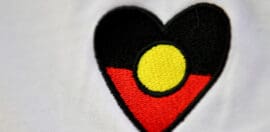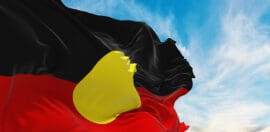Community-led research shows importance of culture in healing from domestic violence

13 April 2022 at 2:50 pm
Blending Western and cultural ways of gathering knowledge, a new research project is developing a best practice framework for addressing the impacts of domestic and family violence on First Nations children and young people.
A recently released report has highlighted the need for culturally safe, community-led responses to domestic and family violence for Aboriginal and Torres Strait Islander children and young people.
The New Ways for Our Families report was commissioned by the Australian National Research Organisation for Women’s Safety in conjunction with Queensland Aboriginal and Torres Strait Islander Child Protection Peak and the Institute of Child Protection Studies at the Australian Catholic University.
It is part of a research project which will produce a best practice framework to guide Family Wellbeing Services (FWS) to respond to Aboriginal and Torres Strait Islander children and young people who are exposed to domestic and family violence (DFV). The research also aims to identify the needs of those young people who are exposed to DFV and come into contact with the child protection system through FWS in regional and remote Queensland.
It’s the first report in a series of two, with the second report to present further community-based findings.
Garth Morgan, a First Nations man and CEO of the Queensland Aboriginal and Torres Strait Islander Child Protection Peak, who was heavily involved in the design, writing and interpretation of the research, said the numbers of Aboriginal and Torres Strait Islander children on child protection orders is rising. He said that successive governments had failed to invest in the systems needed to help First Nations children exposed to DFV.
“Despite the overwhelming nature of our children’s experience of DFV, there has been a lack of focus or limited focus on understanding what will support them to heal and break the intergenerational cycle of distress,” Morgan explained.
“The research we’re doing has highlighted the intergenerational nature of trauma transmission. Unless there’s an opportunity for our children to heal, they are more likely to struggle with developing healthy relationships, regulating their emotions, learning and securing employment when they grow up.
“We know all these factors contribute to perpetuating a cycle of DFV, which in turn often results in the removal of children from their families, communities and culture.”
The report notes that Aboriginal and Torres Strait Islander community-controlled organisations are best placed to provide child and family services in the event of DFV – but they, and families themselves, need stronger support to enable healing and reduce intergenerational impacts. Removing children and young people from their country, culture and community can disrupt the healing.
Culturally safe research
The project is led by Aboriginal and Torres Strait Islander researchers and incorporates cultural values and protocols. The research deliberately blends Western and cultural ways of exploring knowledge, Morgan said, and uses “action research” to examine the issue.
“Action research is a well-established way of doing qualitative research where you have a range of research questions that are explored in an action research cycle, and then that exploration leads to the emergence of new questions, and that gets explored further around, so you’re digging deeper and deeper into a problem,” he said.
“One of the ways we operate as Aboriginal and Torres Strait Islander people is having knowledge circles, yarning circles, and the action research methodology really lends itself well to allow yarning and transmission of knowledge that way.
“What we hope to do is elevate, even privilege, the knowledge and wisdom of Aboriginal and Torres Strait Islander people that are working in their local communities with children that are exposed to DFV and the child protection system.”
Closing the gap
Results gathered so far have confirmed the researchers’ view that children and young people must be put at the centre of DFV responses. Morgan said the research will provide a strong evidence base to “take back to governments” to use in decision-making processes when designing systems to tackle DFV.
“We are really clearly seeing the need for healing circles and trauma-informed programs that are designed specifically for children and ensuring the voice of children is included in the design of those programs,” Morgan said.
“Our research will culminate in the creation of a best practice framework, a model designed by us and for us, but also will show governments how they need to be investing to bring about sustained and positive change for our children.”
He pointed to the target in the National Agreement on Closing The Gap to reduce all forms of family violence by 50 per cent by 2031. He said so far in the life of the agreement he was yet to see any specific programs or funding from a Commonwealth level that would give him hope that they were serious about meeting this target.
“In the lead up to the election, the government and opposition need to commit to sitting down with Aboriginal and Torres Strait Islander people to codesign programs that will work to eliminate violence in our families, and they need to do this in the first year of the new term in government,” he added.
“It’s going to take more than just money, it’s going to take money invested in the right way and the right things and the only way you can do that is by sitting down and talking to the people that are going to be using the services, and we haven’t seen any evidence of that within the DFV space to date.”
The second report will be released later this year.








